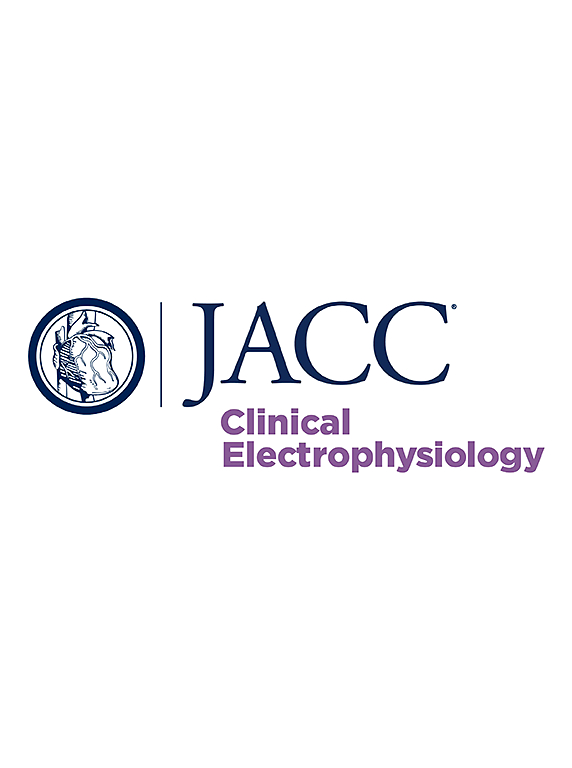Long-Term Changes in Atrial Arrhythmia Burden After Renal Denervation Combined With Pulmonary Vein Isolation
IF 8
1区 医学
Q1 CARDIAC & CARDIOVASCULAR SYSTEMS
引用次数: 0
Abstract
Background
The autonomic nervous system plays an important role in atrial fibrillation (AF) and hypertension. Renal denervation (RDN) lowers blood pressure (BP), but its role in AF is poorly understood.
Objectives
The purpose of this study was to investigate whether RDN reduces AF recurrence after pulmonary vein isolation (PVI).
Methods
This study randomized patients from 8 centers (United States, Germany) with drug-refractory AF for treatment with PVI+RDN vs PVI alone. A multielectrode radiofrequency Spyral catheter system was used for RDN. Insertable cardiac monitors were used for continuous rhythm monitoring. The primary efficacy endpoint was ≥2 minutes of AF recurrence or repeat ablation during all follow-up. The secondary endpoints included atrial arrhythmia (AA) burden, discontinuation of class I/III antiarrhythmic drugs, and BP changes from baseline.
Results
A total of 70 patients with AF (52 paroxysmal, 18 persistent) and uncontrolled hypertension were randomized (RDN+PVI, n = 34; PVI, n = 36). At 3.5 years, 26.2% and 21.4% of patients in RDN+PVI and PVI groups, respectively, were free from the primary efficacy endpoint (log rank P = 0.73). Patients with mean ≥1 h/d AA had less daily AA burden after RDN+PVI vs PVI (4.1 hours vs 9.2 hours; P = 0.016). More patients discontinued class I/III antiarrhythmic drugs after RDN+PVI vs PVI (45% vs 14%; P = 0.040). At 1 year, systolic BP changed by −17.8 ± 12.8 mm Hg and −13.7 ± 18.8 mm Hg after RDN+PVI and PVI, respectively (P = 0.43). The composite safety endpoint was not significantly different between groups.
Conclusions
In patients with AF and uncontrolled BP, RDN+PVI did not prevent AF recurrence more than PVI alone. However, RDN+PVI may reduce AF burden and antiarrhythmic drug usage, but this needs further prospective validation.
肾去神经联合肺静脉隔离术后房性心律失常负担的长期变化SYMPLICITY-AF.
背景:自律神经系统在心房颤动(AF)和高血压中发挥着重要作用。肾脏神经支配(RDN)可降低血压(BP),但其在房颤中的作用却鲜为人知:本研究旨在探讨 RDN 是否能减少肺静脉隔离术(PVI)后房颤的复发:这项研究对来自 8 个中心(美国、德国)的药物难治性房颤患者进行了随机分组,让他们接受 PVI+RDN 与单纯 PVI 的治疗。RDN 采用多电极射频 Spyral 导管系统。插入式心脏监护仪用于连续心律监测。主要疗效终点是在所有随访期间房颤复发或重复消融时间≥2分钟。次要终点包括房性心律失常(AA)负荷、停用 I/III 类抗心律失常药物和血压与基线相比的变化:共有 70 名房颤患者(阵发性 52 人,持续性 18 人)和未控制的高血压患者接受了随机治疗(RDN+PVI,34 人;PVI,36 人)。3.5年后,RDN+PVI组和PVI组分别有26.2%和21.4%的患者未达到主要疗效终点(对数秩P = 0.73)。RDN+PVI组与PVI组相比,平均每日AA时间≥1小时的患者每日AA负担较轻(4.1小时 vs 9.2小时;P = 0.016)。RDN+PVI与PVI相比,停用I/III类抗心律失常药物的患者更多(45% vs 14%; P = 0.040)。1 年后,RDN+PVI 和 PVI 的收缩压变化分别为 -17.8 ± 12.8 mm Hg 和 -13.7 ± 18.8 mm Hg(P = 0.43)。各组间的复合安全性终点无明显差异:结论:对于房颤且血压未得到控制的患者,RDN+PVI 比单独使用 PVI 更能预防房颤复发。然而,RDN+PVI 可减少房颤负担和抗心律失常药物的使用,但这还需要进一步的前瞻性验证。
本文章由计算机程序翻译,如有差异,请以英文原文为准。
求助全文
约1分钟内获得全文
求助全文
来源期刊

JACC. Clinical electrophysiology
CARDIAC & CARDIOVASCULAR SYSTEMS-
CiteScore
10.30
自引率
5.70%
发文量
250
期刊介绍:
JACC: Clinical Electrophysiology is one of a family of specialist journals launched by the renowned Journal of the American College of Cardiology (JACC). It encompasses all aspects of the epidemiology, pathogenesis, diagnosis and treatment of cardiac arrhythmias. Submissions of original research and state-of-the-art reviews from cardiology, cardiovascular surgery, neurology, outcomes research, and related fields are encouraged. Experimental and preclinical work that directly relates to diagnostic or therapeutic interventions are also encouraged. In general, case reports will not be considered for publication.
 求助内容:
求助内容: 应助结果提醒方式:
应助结果提醒方式:


